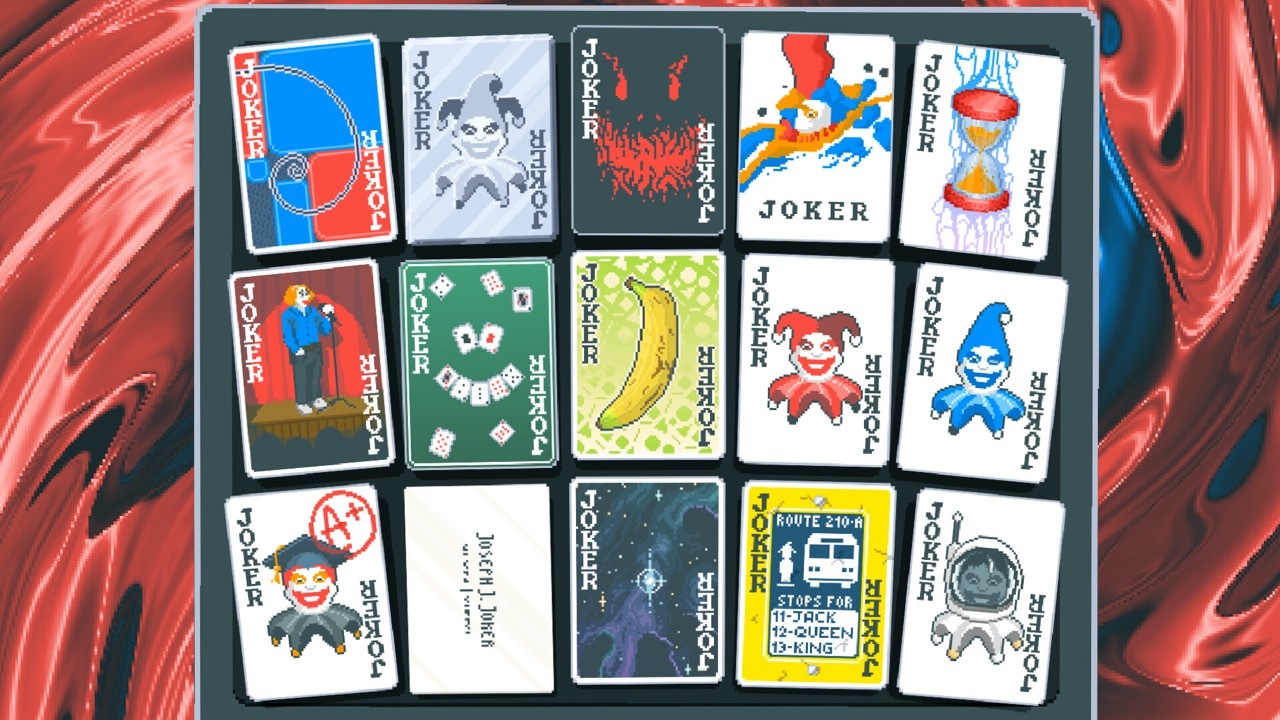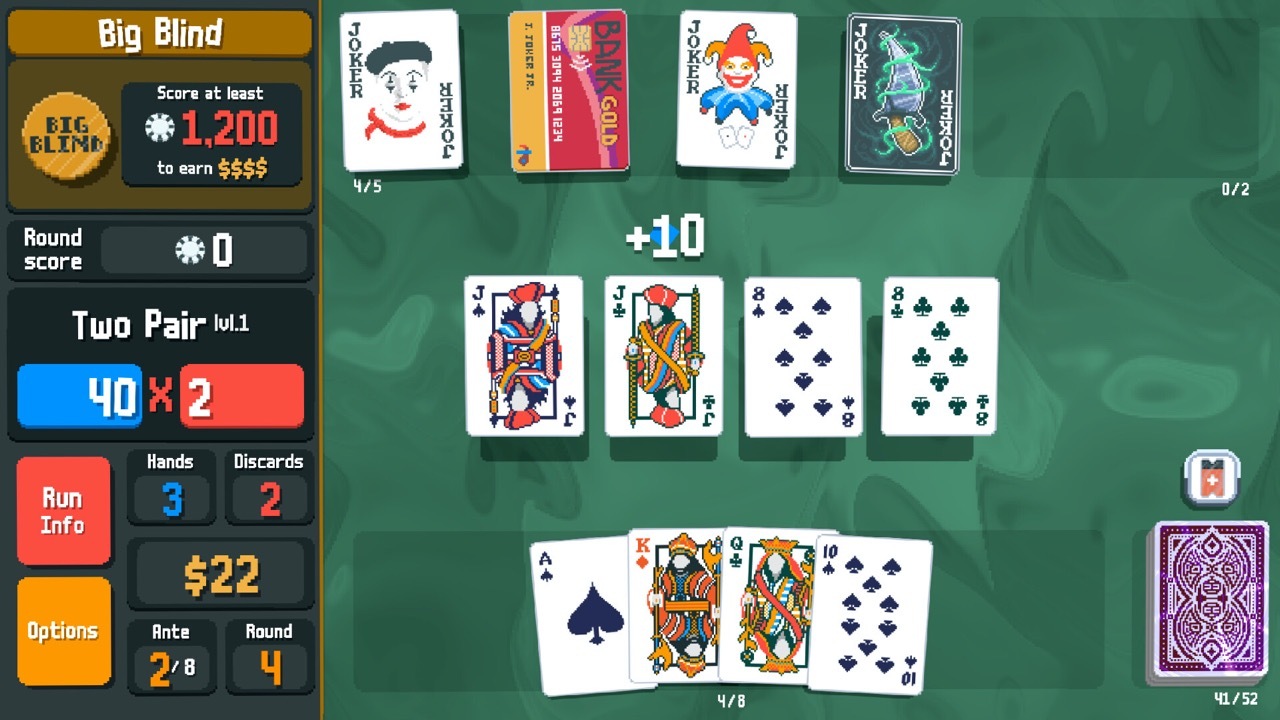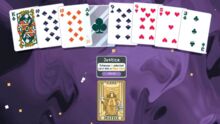Balatro's Secret Sauce Is Not Requiring Perfection
Who needs perfection when Balatro lets you skate by with just good enough?
One of the best feelings in a roguelike is when the pieces all come together to create a perfect run. In Hades it's a powerful combination of powers, in Dead Cells it's a perfect set of weapons, and in Balatro it's all about getting the right combination of Jokers. With the right set of Jokers, a run in Balatro can feel almost easy at times. You have so many Joker effects happening that the game starts to speed up the animations and your score catches on fire because you aren't about to just win the round--you are about to blow past it, making the score you need to reach seem trivial in the process.
These runs are amazing in Balatro and in other roguelikes, but that's because it's not how every run goes. In fact, that's how very few runs usually go. Most runs in Balatro, including many of my winning runs, have me barely beating out each round with my final hand. Every shop or bonus for skipping a blind becomes deeply important, because I need another boost in chips or multiplier; otherwise my run is about to crash and burn. This scrappiness is what makes Balatro special, and there are multiple mechanics that let you take some of the chance out of these runs, making it just as viable to fight tooth and nail to win a run as it is to break the game entirely with your build.
Balatro lets you control your fate (mostly)

While it's not uncommon for roguelikes to allow you to influence the powers or weapons you might receive in a run, Balatro consistently provides you the opportunity to make risk-versus-reward assessments. Each ante has three blinds, two of which can be completely skipped. You won't earn any money or get to visit the shop, but you will get something else. Sometimes it's as simple as a pack of cards to add to your deck, or it can guarantee a Joker of a certain rarity or with a specific bonus type. Importantly, the reward is never a specific Joker--only certain modifiers or rarities. There is never any point where you can guarantee yourself the exact Joker you need, which puts an emphasis on working with whatever Jokers you do get.
One of my favorite decks to run is the Plasma deck, which combines and then averages your chips and multiplier whenever you play a hand, turning 50 chips with a two multiplier into 26 times 26. While that might sound like it's easier to win a round--and it certainly is the first ante or two--this deck also doubles your target score, making it much harder to hit. A quick way to run up your total using this deck is by drastically increasing your chip total, since that number can be easier to inflate compared to the multiplier.
That means a foil Joker, which automatically adds 50 chips to each played hand, can offer a pretty big increase to your score in the short term, even if the Joker itself doesn't work with a run. A guaranteed foil Joker is one of the rewards that can appear for skipping a blind, offering what is essentially an easy way to keep a run alive. Even if the Joker's effect doesn't help your build and you might have to dump it later, it can still get you through more rounds, which means you have more chances to get the right items in the shop.
This sort of influence over your rewards, however small, is incredibly important in Balatro because it's a game about math. In an action-focused roguelike, you can make up for a few bad rolls with skill, so long as you have the skills to dodge or parry consistently. By contrast, you can't win rounds of Balatro through pure skill--you have to work with the materials offered to you. This design feels purposeful, based on other aspects of how the game works.
When you reach a new ante, Baltro presents you with a ton of information. You can see exactly what you need to score in all three blinds to win, what your rewards are for skipping either of the first two blinds, and what the special condition is in the third blind. You might not know exactly what's going to be in the store, but you do know there will be two packs, two card slots that could be Jokers, Tarots, or Planets, and a voucher. You also have a pretty good idea of how much those items all cost, and how much money you will win for each blind beaten.
All of this information is important, because it allows you to make decisions based on both the short-term and long-term impacts of each item. Sure, the first Joker in the shop might not be one you want long term, but any amount of multiplier can help. A foil Joker adding 50 chips could be a huge boost right now, even if the Joker itself is focused on straights when you're building around two pairs. Even as you move up the stakes and the game becomes harder and more complex, with the addition of eternal Jokers that can't be sold or destroyed or perishable Jokers that stop working after five rounds, having this information lets you put together scrappier runs.

What you can do with this information and the small amount of influence Balatro offers you is the ability to adapt. The limitation on how many Jokers you can have at once makes runs more dynamic. It's common in roguelikes, especially deck builders, to have no limit on powerful items like Jokers, with their power stacking on top of each other. The catch though is that you typically can't get rid of these items easily. While you might have a limited number of slots for Jokers, you are rarely stuck with one, letting you dump any conflicting Jokers in an instance, allowing greater flexibility. The Joker that gains one multiplier when you play a hand but loses one when you discard might sound good at first, but if you find yourself needing to discard to play the hands necessary to win, you can easily dump it for something else at the next shop.
These runs don't sing the way that the game-breaking ones do, where you score so much that it starts getting displayed in exponentials instead of numbers. Despite that, they do feel just as satisfying, albeit in a different way. Overcoming a rough start, bad Joker rolls, and special blinds that feel targeted at your specific build is its own kind of magic, creating the kind of run that makes up most of my time playing Balatro. It's much easier to let yourself have just one more run when you always feel like you can throw together a combination of Jokers and cards that is just good enough to get by, instead of your run crashing because you didn't get the perfect combination of items.
All of this comes together to create a roguelike experience where I never feel compelled to abandon a run. Every run feels like it can succeed, right down to the moment where the game over screen appears and even in that moment, I'm sure I could have had it if I had if I had made better choices. That feeling makes it easy to immediately boot up another run again and again, which is perhaps the highest compliment you can give a roguelike.
More Best Of 2024:
- Our Favorite Games That Didn't Make The Top 10
- Best PS5-Exclusive Games Of 2024
- Best Switch-Exclusive Games Of 2024
- Best PC-Exclusive Games Of 2024
- Best Xbox Games Of 2024
- Best-Reviewed Games Of 2024
- Best Of 2024 hub
Got a news tip or want to contact us directly? Email news@gamespot.com







Join the conversation